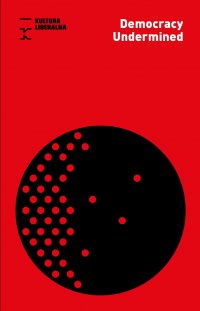Who Are We?
You will find a list of our editors and regular contributors below.
Do you wish to contact a member of our editorial team? Write to us: redakcja (at) kulturaliberalna.pl
Editor-in-chief
Dr Jarosław Kuisz, historian of law and political analyst.
Managing Editor
Dr Łukasz Pawłowski, graduate in psychology and sociology, he holds a doctorate in the latter and writes about political life in Poland and the US.
Editor, International Edition
Tomasz Sawczuk, graduate in law and philosophy, author of political commentaries, specialising in contemporary liberal thought.
Political Section Chief
Dr Karolina Wigura, sociologist and assistant professor at the Warsaw University. Author of the book “The guilt of nations. Forgiveness as political strategy”.
Literary Section Chief
Piotr Kieżun, historian of ideas, head of Kultura Liberalna Publishing House, specialising in the links between literature and politics in the 20th century.
Visual Arts Section Chief
Grzegorz Brzozowski, studied sociology and documentary film making, specialising in performatics and the sociology of religion.
Editorial Board Members:
Dr. Magdalena M. Baran, Bartek Biedrzycki, Marta Budkowska, Dr hab. Marta Bucholc, Dr hab. Tadeusz Ciecierski, Dr. Łukasz Jasina, Wojciech Kacperski, Michał Krasicki, Dr. Paweł Majewski, Dr. Katarzyna Sarek, Ewa Serzysko, Dr. Kacper Szulecki, Dr. Rafał Wonicki
Regular contributors:
Łukasz Bertram, Dr. Adam Bodnar, Justyna Czechowska, Hubert Czyżewski, Marcin Dobrowolski, Wojciech Engelking, Łukasz Faciejew, Dr. Mateusz Fałkowski, Dr. Jacek Głażewski, Helena Jędrzejczak, Michał Jędrzejek, Monika Helak, Emilia Kaczmarek, Konrad Kamiński, Dr. Katarzyna Kasia, Katarzyna Kazimierowska, Eliza Kącka, Prof. Padraic Kenney, Maciej Komornik, Dr. Piotr H. Kosicki, Dr. Tomasz Kozłowski, Jakub Krupa, Prof. Ireneusz Krzemiński, Rafał Kucharczuk, Michał Matlak, Marta Michalska, Adam Puchejda, Krzysztof Renik, Alicja Rosé, Krzysztof Siwoń, Jakub Sypiański, Prof. Paweł Śpiewak, Dr. Jan Tokarski, Jacek Wakar, Rafał Woś, Olga Wysocka, Viktoriia Zhuhan.





